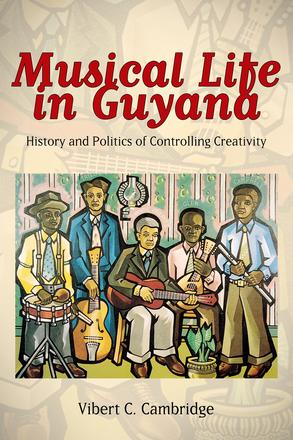
Musical Life in Guyana
History and Politics of Controlling Creativity
A study of how Caribbean music and identity evolve when the government controls all media
Description
Musical Life in Guyana is the first in-depth study of Guyanese musical life. It is also a richly detailed description of the social, economic, and political conditions that have encouraged and sometimes discouraged musical and cultural creativity in Guyana. The book contributes to the study of the interactions between the policies and practices by national governments and musical communities in the Caribbean.
Vibert C. Cambridge explores these interactions in Guyana during the three political eras that the society experienced as it moved from being a British colony to an independent nation. The first era to be considered is the period of mature colonial governance, guided by the dictates of “new imperialism,” which extended from 1900 to 1953. The second era, the period of internal self-government and the preparation for independence, extends from 1953, the year of the first general elections under universal adult suffrage, to 1966, the year when the colony gained its political independence. The third phase, 1966 to 2000, describes the early postcolonial era.
Cambridge reveals how the issues of race, class, gender, and ideology deeply influenced who in Guyanese multicultural society obtained access to musical instruction and media outlets and thus who received recognition. He also describes the close connections between Guyanese musicians and Caribbean artists from throughout the region and traces the exodus of Guyanese musicians to the great cities of the world, a theme often neglected in Caribbean studies. The book concludes that the practices of governance across the twentieth century exerted disproportionate influence in the creation, production, distribution, and consumption of music.
Reviews
"Musical Life in Guyana provides a detailed and timely interrogation of Guyana's history through an examination of the many musical forms that have marked its transition from colony to nation."
- Gillian Richards-Greaves, New West Indian Guide
"Vibert Cambridge's welcome study is the first to look at Guyanese music both in great depth and in all its breadth."
- Kenneth Bilby, Smithsonian Institution, Latin American Music Review
"This book unquestionably breaks new ground. To my knowledge, this is the first in-depth study of Guyanese musical life. It provides richly detailed descriptions of the socioeconomic and political conditions that have encouraged and, at other times, discouraged musical activities at different historical moments in Guyana. It illuminates how the issues of race, class, gender, and ideology have deeply influenced who in Guyanese multicultural society had access to musical instruction and media outlets and have received recognition. The author maps how the lively musical network in Guyana nurtured unique aesthetics and sensibilities in the country, for musicians and the public alike. This is a study that celebrates Guyanese national heroes. In a postcolonial society, this is an important and needed gesture."
- Peter Manuel, author of Caribbean Currents: Caribbean Music from Rumba to Reggae